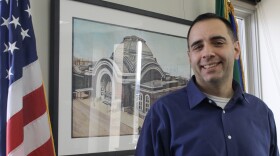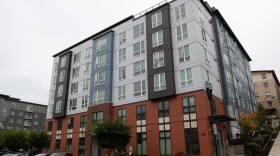A metaphor for Tacoma — that’s what Ryan Spence, head of the South Sound Manufacturing and Industrial Council, calls this former casket factory by the train tracks.
"We're standing in front of the Willamette Casket Company building, built in 1908," Spence said, looking up at the dormant chimney from the old boiler room.
This building hasn’t produced a coffin in over a hundred years. Weeds hang from windows and cracks in the brick letters.
On the outside, it could be a metaphor for Tacoma's manufacturing sector: factory jobs in the city have been below the national average since at least the '70s, according to data from Workforce Central, a public-private partnership. This fall, the WestRock paper mill — which dominates the Tacoma tideflats with its iconic array of pluming stacks — is closing, taking about 400 jobs and $25 million dollars annually of water and power that will probably result in rate hikes for citizens.

But Tacomans who spoke to KNKX are not pessimistic. They're hopeful the city is well-poised to take advantage of the state and nation's green transition, and experts agree it's possible — though much is still up in the air.
Boosters like Spence point to this casket factory, which may look dead from the interstate or the windows of passing trains. But as Spence takes the freight elevator up and inside, it's clear the building is buzzing with activity.
On the fifth floor is a small-business incubator: Spence makes climbing wall holds and skate ramps across the floor from a home goods company and a fulfillment center that ships everything from bath towels to power-lifting belts.
Norma Szczepanski, who's worked under this roof for 41 years for a number of companies — some of which are long-gone — crinkles the belts' wrapping.
"These are really heavy," she said.
Downstairs there’s sewing machines, clothing design and apparel companies. Some are small and local, such as TRUE Linkswear, a golf shoe and clothing company, or larger and regional, such as a prototype outerwear shop for Pendleton clothing.
When this factory was built, Tacoma was a center for lumber and wood products, the largest furniture producer west of the Mississippi. The factory even switched from caskets to furniture when its ownership traded hands in 1922.
Yet furniture is not what the city became known for: between the wood pulp and paper mills, smelters, and oil refining, Tacoma was more well-known for the smell of incinerated chemicals and sulfur. The "aroma of Tacoma." It’s most commonly described as rotten eggs.
"Mainly duck eggs, because it wasn't regular chicken eggs," said Don Meyer, who took a job at what became the WestRock paper mill in 1966. It's the place most associated with the aroma, though historians say mill owners put the blame on the infamous copper smelter across Commencement Bay.
"I almost passed out because the aroma was so strong," Meyer said. When he walked out to the parking lot, he discovered all the cars were covered in particles.
"Air so thick you could chew it," in the words of Tacoma-born sci-fi author Frank Herbert. His bestseller Dune was inspired partly by the pollution he saw growing up.
Today, more Tacoma residents work in neighboring Seattle and King County than in the city’s manufacturing sector. Meyer is now a Tacoma port commissioner and business owner.
"We are pretty much a bedroom community to King County," he said. "Whether we like it or not."
Tacoma long-timers like him say the real Tacoma aroma also disappeared in the ‘70s, after a city push. Others, like Spence, say it disappeared 25 years ago when a part of the mill closed down.
But many say some version of it has lingered. Almost like it’s baked into the city. Chrissy Cooley moved to Tacoma in 2009.
"I crested the hill of Tacoma, and just as I saw the Tacoma Dome and all of this beautiful future that was coming with it, I also smelled the Tacoma aroma for the first time," Cooley said. "And it made my nose kind of tingle."
She's now the executive director of the Puget Sound Clean Air Agency and a huge fan of the city, showing up for an interview in a shirt that said "green and gritty" and earrings shaped like the Tacoma tideflats, where the city has banned new fossil fuel development.
"This is definitely a big turning point for Tacoma," Cooley said. "We have every opportunity to keep the grit. Keep that Tacoma pride."
A short drive down the road from the paper mill, the U.S. Oil refinery is scoping out a green hydrogen and sustainable aviation fuel project. With the Pacific Northwest named a “hydrogen hub” by the Biden Administration, and a Washington state goal to double manufacturing jobs in a decade, Tacomans like Cooley hope for a return to the city’s blue-collar roots, without the smell.
"It is not true that decent working jobs must inherently come with environmental misery," Cooley said.
For all its enthusiasm, there’s a real question whether Tacoma can capitalize on this moment. Greening the economy is going to require lots of blue-collar skilled workers — the kind that have been leaving Tacoma for decades.
"A lot of places are paying lip service to this stuff. It sounds great in stump speeches," said Joseph Kane, a fellow at the Brookings Institution. He looked through hundreds of governments’ green economic strategies, including Tacoma's from this year.
"To the extent it's actually equipping workers with new skills, and connecting them to new opportunities, that's where the devil is in the details, and it's often lacking in a lot of cities."
Tacoma's strategy — which Kane said is better than many, with some concrete measures of success — focuses on creating a welcoming environment for young businesses, and drawing workers.
Back at the casket factory, Spence has set up a whole skate park on the fifth floor. It's open to the community on Sundays. He hopes exposure like that can draw in the next generation of workers for Tacoma’s industries.
"They can come here to skate and then see that, 'oh, there are jobs where you can design shoes, or design rock climbing holds or build skateboard ramps or make skateboards,'" Spence said.
In this factory, there's no overpowering aroma — just whiffs of burnt suede, polyurethane; a lilac candle at a sewer’s station.
KNKX Connects is an ongoing series showcasing the people and places of our diverse and vibrant region. Your support helps KNKX connect listeners throughout Western Washington, presenting a much deeper look at the place we call home. Donate to this vital community service today.







